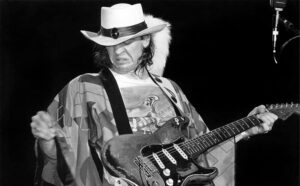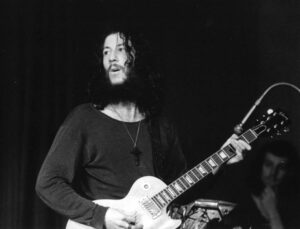Over the past couple of weeks, I have listened to a greater variety of blues music than ever before. I have discovered new artists and new albums, which has deepened my understanding and love of the blues.
Not only has this helped me to develop as a musician, but it has made me realise just how much brilliant blues music there is out there.
The blues is a rich and extensive genre, and within the blues there are many different styles and sub-genres.
There is a style of blues to suit every mood and moment of the day. Yet despite this, it is easy to fall into the trap of always playing the same albums.
I have been guilty of this in the past, but over the last year I have really tried to keep on discovering new blues music.
So in an effort to help us all expand our musical horizons – from today, each week I am going to write about a different blues album that I feel is significant.
I will look at historically significant albums, albums that have had a significant impact on the blues as a genre, and albums that are significant simply because they illustrate excellent musicianship.
This is not a ‘Countdown Of The Best 100 Blues Albums’, nor is it going to be in chronological order.
Each week I will look at a different decade, and I am going to cover everything from traditional acoustic blues, to modern, fuzz-laden blues rock.
I hope the variety will keep things interesting, and mix up your own blues playlists and record collections.
Today then, I am kicking things off with one of my favourite live blues albums. The first album in my blues record collection is B.B. King – Live In Cook County Jail :
B.B. King – live in Cook County Jail
Recorded on September 10th, 1970, B.B. King – Live In Cook County Jail is broadly recognised not only as one of B.B. King’s best performances, but as one of the best live blues albums of all time.
Upon its release, the album spent thirty-three weeks on the Billboard Top LPs chart, peaking at number twenty-five. It also reached number one on the Top R&B chart, and was King’s only album to do so.
Later, in 2002, the album was inducted into the Blues Foundation Hall of Fame.
Yet despite these successes, Live In Cook County Jail is often overlooked in favour of Live At The Regal.
Recorded six years earlier, in 1964 – Live At The Regal is regarded as B.B. King’s finest work. It is an incredible album, and is one that I will no doubt be covering in a future article.
But I believe that Live In Cook County Jail is an equally interesting album for two reasons:
Firstly, King’s guitar playing is exceptional.
Even Rolling Stones Magazine, who published a very mixed review of the album in 1971, stated: “The guitar playing on Cook County is as good as the man ever plays: he is in top form from beginning to end.”
Secondly, the unique setting and circumstances in which the album was recorded give it a different feel and power.
The album was recorded live in Chicago’s Cook County Jail, in front of 2,117 male and female inmates.
Playing in this setting was a new experience for King and his band, and it was an environment that was initially challenging.
As Ron Levy – King’s keyboard player at the time stated: “At first it was kind of exciting…(But) once those iron doors slammed behind you it was like ‘oh man.’ I had reservations about our decisions.”
You can hear this within the music. ‘Every Day I Have the Blues‘ – the track that the band open with – is fast paced and jittery.
King himself later admitted, “Well, yes, yes – I was nervous.”
Although these nerves quickly subsided (at least noticeably), the experience of performing at Cook County Jail had a profound impact on King.
Prison blues
B.B. King was not the first famous musician to perform at a prison. By 1970, Johnny Cash had already performed at a number of different prisons.
And he had achieved great commercial success with his live album At Folsom Prison, which helped to revitalise his career.
King’s decision to play at Cook County Jail was not motivated by the success of Cash’s albums. In 1970, King’s career didn’t need revitalising; he was enjoying one of the most fruitful moments of his career.
In the early 1960s, British musicians like Eric Clapton and The Rolling Stones had helped to introduce the blues to a white audience. This opened new doors for King.
He started to play in much larger venues and performed as the opening act for The Rolling Stones during their 1969 American Tour.
In the same year he also achieved major success with his version of ‘The Thrill Is Gone‘, for which he won a Grammy Award in 1970.
For King then, the Live In Cook County Jail performance was not so much a commercial venture, as a philanthropic one. As keyboardist Levy remarked:
If anybody had the blues, it was those people incarcerated. And B.B. really felt compassion for these guys…And let’s face it, a lot of the people who are incarcerated, they were in his audience at one point or another
Here Levy references the fact that when King performed in Cook County Jail, a disproportionate percentage of the convicts in the jail were black.
King estimated that the number was as high as 70-75%. Life for these inmates was very challenging.
Cook County Jail
In 1968 – just two years prior to King’s performance – the Illinois Crime Commission described Chicago’s Cook County Jail as a ‘jungle’. As a former prisoner observed at the time:
Any – and everything went. Anything from heroin to whisky was sold and traded in the jail. Homosexual rape, bribery and murder were the bill of fare. No one seemed to give a damn
The warden was dismissed and replaced by Winston Moore, a psychologist and the first African American to be appointed as a prison warden.
On Moore’s first day, he confiscated 200 weapons and a large quantity of illegal drugs from the prison’s cells. Slowly he was able to restructure and bring some level of stability to the prison.
In 1970, Moore approached King after a gig at the famous Chicago nightclub ‘Mister Kelly’s’. As King recalled:
He (Moore) said to me, ‘It’s a first for you at Mister Kelly’s and it’s a first for me as a black person over here, so why don’t we both get together and do another first and get you to play for the inmates?’
Happily, King agreed. On that day, he and his band transformed the mood of the prisoners.
The album starts with the inmates booing the prison official that opens the gig and thanks various members of the prison administration for arranging the event.
It ends with them cheering and applauding.
Stand out songs
For the gig, King predominantly chose to play songs from his back catalogue. Some of these songs – like ‘3 O’Clock Blues‘ were from as early as the 1950s.
Only ‘The Thrill Is Gone’ was a new song for King at the time.
This was part of the criticism levelled at King when the album was released. As Jon Landau wrote for Rolling Stones magazine in 1971:
Cook County is little more than a rehash of the familiar B.B. King which, despite its great moments, has already been given definitive statement elsewhere, most memorably on Live At the Regal.
Whilst it is true that there are obvious similarities between the two albums, there is a different quality to King’s guitar playing on Live In Cook County Jail.
It is interesting to listen to and compare the two albums.
I think all of the tracks on Live In Cook County Jail are brilliant, but for me, there are three songs that really standout. These are as follows:
In his Rolling Stones review, Landua wrote disparagingly of ‘B.B.’s tendency to talk too much on stage.’
When it comes to this particular track, Landau might have a point. King talks to the audience for almost half the song, making jokes and telling them that men and women are God’s gift to one another.
Whilst this might not be my favourite part of King’s performance, I think the song is one of the best on the album. This is thanks to King’s exceptional opening solo.
Lasting almost three minutes long, it illustrates King’s amazing ability to say so much with just a handful of notes and to effectively build the pace of a solo from a slow start to a blistering conclusion.
Medley: 3 O’Clock Blues/Darlin’ You Know I Love You
For this medley, King chose two songs from his debut album, Singin’ The Blues. And for his performance at Cook County Jail, King reworked both songs.
He turned them into beautiful and uplifting slow blues tracks.
The medley features some brilliant guitar playing that really highlight’s King’s ability to utilise dynamics in his playing.
He is constantly altering his attack to bring a different feel to his playing and to the two different songs.
King’s performance of his most famous song at Cook County Jail is flawless. His vocals are beautiful and impassioned and his guitar playing is exceptional.
It is truly one of the best versions of this song that King ever performed, and is definitely my favourite song from this album.
Legacy
Arguably, Live In Cook County Jail had a greater social impact than it did a musical one.
The album is always overlooked in favour of Live At The Regal. That is considered to be King’s finest live album and so Live In Cook County Jail tends to receive little attention as a result.
Yet the performance at Cook County Jail had a profound impact on King.
He was deeply moved by his experience at the prison, and saddened by the institutional racism that had resulted in a disproportionate percentage of the prisoners being black.
Just one year after his performance, King launched the Foundation for the Advancement of Inmate Rehabilitation and Recreation, which pushed for improved conditions in prisons and put on shows at different prisons across the U.S.
For this work, he was given the Humanitarian Award by the director of the Federal Bureau of Prisons in 1972.
King also offered to play for free at any prisons that were happy to host him. So over the course of the following thirty years, he played free concerts at over fifty prisons.
As King’s band member Ron Levy so accurately put it:
People don’t realize B.B. King was much more than just a musician and entertainer. He’s a human being, a humanitarian. He cared…He’s one of the really good guys.
There aren’t many like him in history. He’s not just the king of the blues. He’s one of the kings of humanity.
In the end then, Live In Cook County Jail is celebrated to this day, not just because it captures King almost at his very best, but rather because it illustrates the potential power of music as a force for good.
And that is why Live In Cook County Jail needs to be in your blues record collection.
Images
Vinyl Thrift Chaser, Independent, Amazon, Pinterest
References
Rolling Stone, Wbez, Udisccover Music, Wikipedia, Chicago Reader, Independent, Wikipedia, Chicago Tribune, Wikipedia, All Music, The Atlantic





Responses
Been reading your articles about amps and pedals for 2 hours this morning.
This article about the ‘Live in Cook Country Jail’ album is amazing. I had no idea about all the history and implications behind it.
Thank you for your research and writing. I cried a little reading about King’s efforts to improve the suffering of prisoners and his people who were/are suffering from the prejudicial forces.
I’ve always loved ‘how blue can you get?’ from this album. In my view, this is his best performance of the song.
Your article has given me emotional and psychological excitement to listen to the whole album and put it on the rotation.
Keep doing your work. The writing is very good and well considered.
Thank you so much for the kind words Andrew and for taking the time to comment, I really appreciate it.
The more I learn about B.B.King the more he inspires and amazes me. Not only was King one of the most gifted blues guitarists and musicians of all time, but by all accounts he was a warm and generous person who spread love and good vibes. And so like you, when I discovered the story behind Live In Cook County Jail the album took on a new life, and I have since enjoyed listening to it even more than I did initially.
Thanks again and if there is anything at all I can help with – be it music recommendations, or tips on gear or playing – just send me an email on aidan@happybluesman.com. I am always around and happy to help!